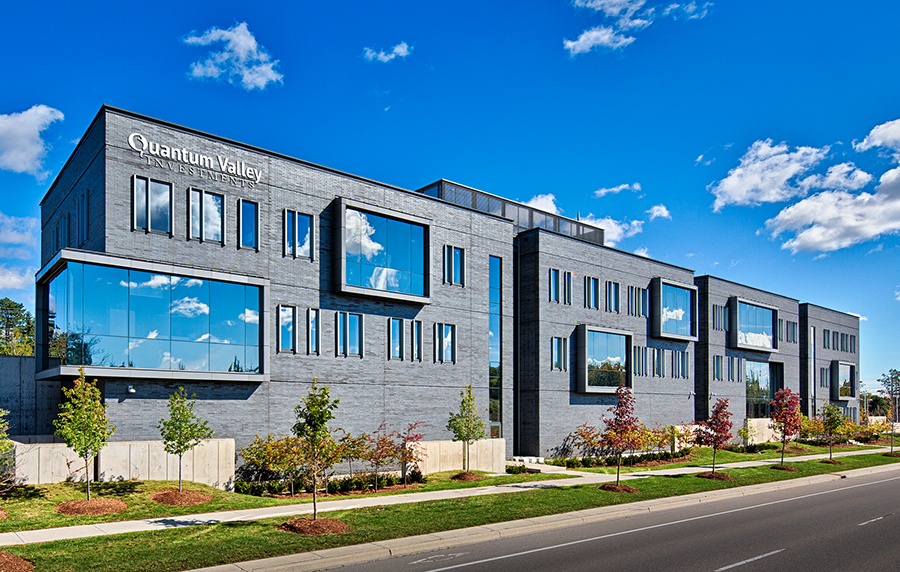Welcome to the quantum era
Technology today exists because of a series of inventions. The transistor made modern computers possible in 1947. The internet connected the world in 1983. More recently, artificial intelligence has changed the way we work and solve… pretty much any problem.
Every few decades, a breakthrough comes along that rewrites the rules, and companies must adapt or get left behind.
Now we’re entering the quantum era, and just like those past revolutions, this one is set to change the game.
You’ve heard of quantum before. The industry that has the power to transform how we approach computation, security and research forever. Unlike classical computers, quantum systems can compute multiple possibilities at the same time, opening the door to ideas and innovations we could never have imagined.
So what will quantum actually do?
Quantum computing, perhaps the most popular application, will be able to solve problems that no other computer can touch, like simulating quantum particles and cracking modern encryption systems.
To put it into perspective:
In December 2024, Google’s new quantum processor completed a benchmark computation in under five minutes, a task that would take today’s fastest supercomputers 10 septillion years.
In February 2025, Microsoft revealed the Majorana 1 chip, a milestone in making quantum computers more stable and easier to scale.
This is why organizations around the world are locked in a race to the top.
Tech giants like Google, IBM and Microsoft are aggressively developing quantum hardware and software. Governments around the world are pouring billions into quantum investments and initiatives. Research institutions are turning once-theoretical ideas into real-world technology.
And one of the key players leading the charge? Waterloo, Canada.
Nicknamed Quantum Valley, Waterloo has built one of the world’s most advanced quantum ecosystems. Home to world-class institutions like the Perimeter Institute for Theoretical Physics, the Institute for Quantum Computing (IQC), the University of Waterloo, Quantum Valley Investments and the Quantum Valley Ideas Lab, the region is a powerhouse of talent, research and commercialization.
How did Waterloo Region become a global leader in quantum? It didn’t happen overnight. It took vision, investment and decades of work to build the ecosystem that exists today.

How did Waterloo get here?
Laying the foundation (2000s)
In the early 2000s, Waterloo started planting the seeds for its quantum future, nurturing what would grow into a world-class ecosystem.
- 2000: Mike Lazaridis, co-founder of BlackBerry, establishes Perimeter Institute of Theoretical Physics with an initial pledge of $100M, one-third of his net worth. It would later become the world’s largest research hub for theoretical physics.
- 2002: Mike Lazaridis and David Johnston, then-president of the University of Waterloo, fund the creation of Institute of Quantum Computing (IQC), which would grow into a world-renowned centre attracting top researchers and students.
- 2006: Researchers at the IQC and Perimeter Institute, in collaboration with MIT, benchmark a 12-qubit quantum processor, a significant step forward for quantum information processors.
Growth & expansion (2010s)
As research advanced, Waterloo’s quantum scene grew quickly. New labs, facilities and funding initiatives helped accelerate progress.
- 2011: The Stephen Hawking Centre opens at Perimeter Institute, expanding its research capacity.
- 2012: The Mike and Ophelia Quantum-Nano Centre (QNC) opens as a shared state-of-the-art facility for IQC and the Waterloo Institute for Nanotechnology (WIN).
- 2013: Quantum Valley Investments (QVI) launches, with a focus on commercializing breakthrough quantum technologies.
- 2016: Quantum Valley Ideas Lab (QVIL) opens as an independent research lab focused on applied research projects and commercialization.

Quantum boom (2020s)
Years of thoughtful research, investment and collaboration have helped Waterloo emerge as a global leader in quantum science and technology.
- 2021: Researchers at IQC conduct the first simulation of baryons on a quantum computer, a major step forward in simulating atomic particles.
- 2023: Canada launches a $360M National Quantum Strategy in Waterloo, amplifying Canada’s leadership in the field.
- 2023: Six Perimeter Institute researchers are recognized as the “best researchers in physics” by Research.com.
- 2024: Researchers at IQC achieve a milestone in quantum communications by finishing its quantum source for the QEYS Satellite.
- 2025: Waterloo is home to 20+ quantum companies and institutions, cementing its reputation as a global leader in quantum.
Waterloo's quantum ecosystem by the numbers
How quantum fuels economic growth
From Mike Lazaridis’s initial multimillion-dollar contributions to consistent support from federal and provincial governments, private investors and philanthropists, Waterloo has attracted more than $1.5B in quantum-related investments.
Few places in the world have bet on quantum like Waterloo, and it’s paying off. These investments have helped propel Waterloo into the international spotlight.
Much of this success can be attributed to the phenomenal work being done at IQC and Perimeter.
- IQC has played a leading role in advancing quantum information science at the highest level, while also bridging the gap between research and commercialization.
- PI has pushed the boundaries of fundamental quantum research, strengthening Waterloo’s research community and helping the region become a global destination for quantum talent.
Beyond their research contributions, these institutions have continually attracted top-tier global talent.
IQC alone has over 300 researchers working on quantum technologies, while PI has drawn world-class faculty, postdoctoral researchers and students from across the globe. This steady talent pipeline helps drive job creation, industry partnerships and startup formation, reinforcing Waterloo’s status as a global quantum hub.
" By investing in and supporting quantum technology, we are ensuring Canada's competitiveness on the global stage and also paving the way for even more ground-breaking advancements that will shape the future of our economy and society. "
The Honourable Bardish Chagger
Member of Parliament for Waterloo
The impact of these investments, though, has stretched far beyond research and talent attraction. They’ve helped create highly skilled jobs in physics, engineering and computer science, with many researchers transitioning into industry roles or launching their own startups.
Some of the quantum startups born in Waterloo include:
- Open Quantum Design: A non-profit startup building the world’s first open-source full–stack quantum computer.
- EvolutionQ: A quantum-safe cybersecurity company helping organizations prepare for the post-quantum era.
- High Q Technologies: Developing quantum-enabled scientific instruments for biophysical and chemical analysis.
- QEYnet: Building the world’s first global quantum key distribution network, enabling ultra-secure communication.
- SoftwareQ Inc: Developing the software needed to correctly operate quantum platforms like reliable quantum compilers, optimizers and simulators.
Funding the future of quantum
According to the National Research Council of Canada, the quantum sector could become a $139B industry in Canada, creating more than 200,000 jobs and generating $42B in returns by 2045, potentially contributing to 3% of Canada’s GDP. But reaching that potential will require sustained funding and long-term commitment.
In January 2023, the Government of Canada launched the National Quantum Strategy (NQS) with a $360M investment to strengthen Canada’s global leadership in quantum innovation.
With a focus on quantum computing, communication networks and sensing technologies, the strategy aims to translate cutting-edge research into commercial applications, develop top talent and establish Canada as a world leader in the global quantum economy.
Waterloo’s leadership in quantum research and commercialization has made it a focal point for national investment. Recent funding highlights include:
- January 2024: Ontario makes a $14.9M investment to support a project by Quantum Valley Ideas Lab (QVIL)
- February 2024: FedDev Ontario announces $17.2M in funding to support 12 quantum projects and create 150 jobs in Southern Ontario, including Waterloo
- June 2024: Government of Canada invests $18.4M in quantum research at IQC Canada Inc.
By continually funding research, commercialization and talent development in Waterloo, the government is not only demonstrating its confidence in the region’s potential but also betting on the region to drive Canada’s broader quantum ambitions.
How can your company join in?
As Waterloo’s quantum industry grows, so do the opportunities for companies and investors to get involved. The good news is that there are multiple ways to establish a foothold in this ecosystem, and we’re here to help.
Here are three ways you can get in on the action:
1. Set up a research hub in Waterloo
One of the most effective ways to enter the quantum space is by establishing a small, focused research outpost in Waterloo. This approach gives your company access to a robust ecosystem of talent, facilities and partnerships, without the need for full-scale expansion.
A small team of researchers can collaborate with leading institutions like PI and IQC, access state-of-the-art quantum labs and scout talent from our universities and colleges.
Establishing a presence in Waterloo also opens the doors to valuable funding opportunities. Programs like the SR&ED Tax Incentive Program (up to 35% tax credit) and Alliance Quantum Grants (ranging from $50,000 to $500,000 per year) can offset R&D costs and accelerate your work.
For companies ready to take the next step, Waterloo EDC can provide guidance on navigating the ecosystem from securing office space to connecting with key research partners.
We’ve helped develop R&D offices for multiple companies such as Bosch, Turntide Technologies and Lincoln Electric, helping them tap into local expertise, access world-class facilities and integrate into Canada’s innovation network.
2. Partner with research institutions
Collaborating with research leaders like IQC and PI is another effective entry point into Waterloo’s quantum ecosystem.
These partnerships can take many forms, from funding specific research initiatives to collaborating on applied projects that bridge the gap between academic breakthroughs and real-world business applications.
Sponsoring research in areas relevant to your industry, whether that be quantum cryptography, optimization or communication, can provide early access to new discoveries, the opportunity to shape research directions and, in some cases, priority rights to commercialize emerging technologies.
Unlike conventional R&D models that require building in-house quantum expertise from the ground up, these collaborations allow businesses to leverage existing knowledge and infrastructure.
3. Acquire or fund a startup
For larger companies, acquiring or funding a startup offers a fast-track into the quantum sector.
Many Waterloo-based quantum startups, often consisting of less than 10 researchers, are working on cutting-edge quantum innovations but lack the funding and resources needed to scale. By acquiring a startup, your company can bring quantum expertise in-house while shaping the startup’s research to align with your business objectives.
Funding a startup, on the other hand, allows companies to nurture and guide quantum innovation without high upfront risk. This can be done through capital investments, strategic partnerships and incubator programs that provide startups with the resources and business mentorship they need to scale.
In return, your company gains access to emerging quantum technologies and a competitive edge in a rapidly developing field.
Ready to explore quantum opportunities in Waterloo?
Like transistors and AI, quantum technology is changing the game, and Waterloo is already in the lead.
As the industry evolves, now is the time to explore, invest and innovate. Waterloo offers one of the world’s most advanced quantum ecosystems, and we’re here to help you tap into it.
Our team can connect you with the right people, funding programs and research partners to help your company succeed in Quantum valley, and our services are completely free.
We can help
Let's discuss your expansion goals
About Waterloo EDC
Waterloo EDC is a free, one-stop concierge service for companies that are exploring business expansion in Waterloo, Canada. Our client-first approach focuses on your company’s specific needs, and we have a team of experienced economic development experts who will guide you through every stage of the expansion process.
In addition to helping you find the best candidate to lead your local expansion, we can help you:
- Connect with legal, financial and recruitment experts
- Collect custom expansion data including cost comparisons
- Take advantage of government support and incentives
- Explore real estate options and locations
- Access top talent and local leaders
- Integrate into the local business community
We’ve helped international businesses invest almost $2B in our community since 2016. Our clients include Toyota, MasterClass, EPAM Systems, Beckhoff Automation, BOSCH, SAP, Siemens and many more.
We’re excited to hear about your expansion goals.


